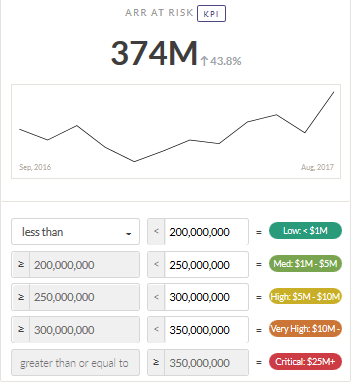Driving assessments with metrics
Associate metrics with assessment drivers to automate risk or control assessments in the Strategy and Projects apps. Once a metric is used in an assessment driver, be careful to avoid changing it so that you do not disrupt the automated assessment.
What is an assessment driver?
An assessment driver is an automation tool that allows you to keep your assessments current, in real-time. You can create multiple assessment drivers to automate different risk and control assessments.
Tip
Use metrics to automate operational risk assessments in Projects. Use them to automate strategic or enterprise risk assessments in Strategy.
How it works
After you have completed the prerequisite set up tasks in the Strategy or Projects app, you:
- Create a metric to associate with the assessment driver for a risk or control. Your metric must generate a numeric value. You cannot use metrics based on dates.
- Link the metric to the risk or control in the appropriate app.
Note
To link a metric to a risk or control, your Collection role must allow you to view the metric. For more information about roles, see Results app permissions.
- Define the metric ranges that will be used to populate scores for the assessment.
For more information about automating assessments, see the following:
| App | Assessment type | Link |
|---|---|---|
| Projects | Operational risks | Automating risk assessments |
| Projects | Controls | Automating control assessments |
| Strategy | Strategic risks | Configuring automated risk assessments |
Example
Automating a strategic risk assessment
Scenario
You are the CEO of an organization that offers a subscription-based service. You have identified maintaining annual recurring revenue (ARR) in the North America region as a strategic risk. ARR is directly related to how much customers pay the organization and whether or not they renew their subscription.
The metric that you use to help assess and monitor the ARR risk is called "ARR at risk". As customer churn increases, the impact of renewing key customers also increases.
Process
First, you configure risk scoring by quantifying the impact of financial loss associated with the ARR risk as follows:
- > $1,000,000 = Low
- ≥ $1,000,000 < $5,000,000 = Medium
- ≥ $5,000,000 < $10,000,000 = High
- ≥ $10,000,000 < $25,000,000 = Very High
- ≥ $25,000,000 = Critical
Then, you link the "ARR at risk" metric you created in the Results app to the ARR risk in the Strategy app.
Finally, you create an assessment driver by defining a series of metric ranges that will be used to populate inherent risk scores:

Result
The risk assessment is automated:

If you subscribe to updates about the risk, you are notified via the daily summary email whenever a change to the risk assessment occurs.
Changing metrics associated with an assessment driver
Once a metric is associated with an assessment driver, any metric configuration changes you make in the Results app disable the assessment automation in the Strategy or Projects app.
Note
Changing the name of the metric also disables any associated assessment drivers.
If you need to edit a metric that is associated with an assessment driver, consider copying the metric and editing the copy. The copy is not associated with any risk assessment and does not disable your automation.